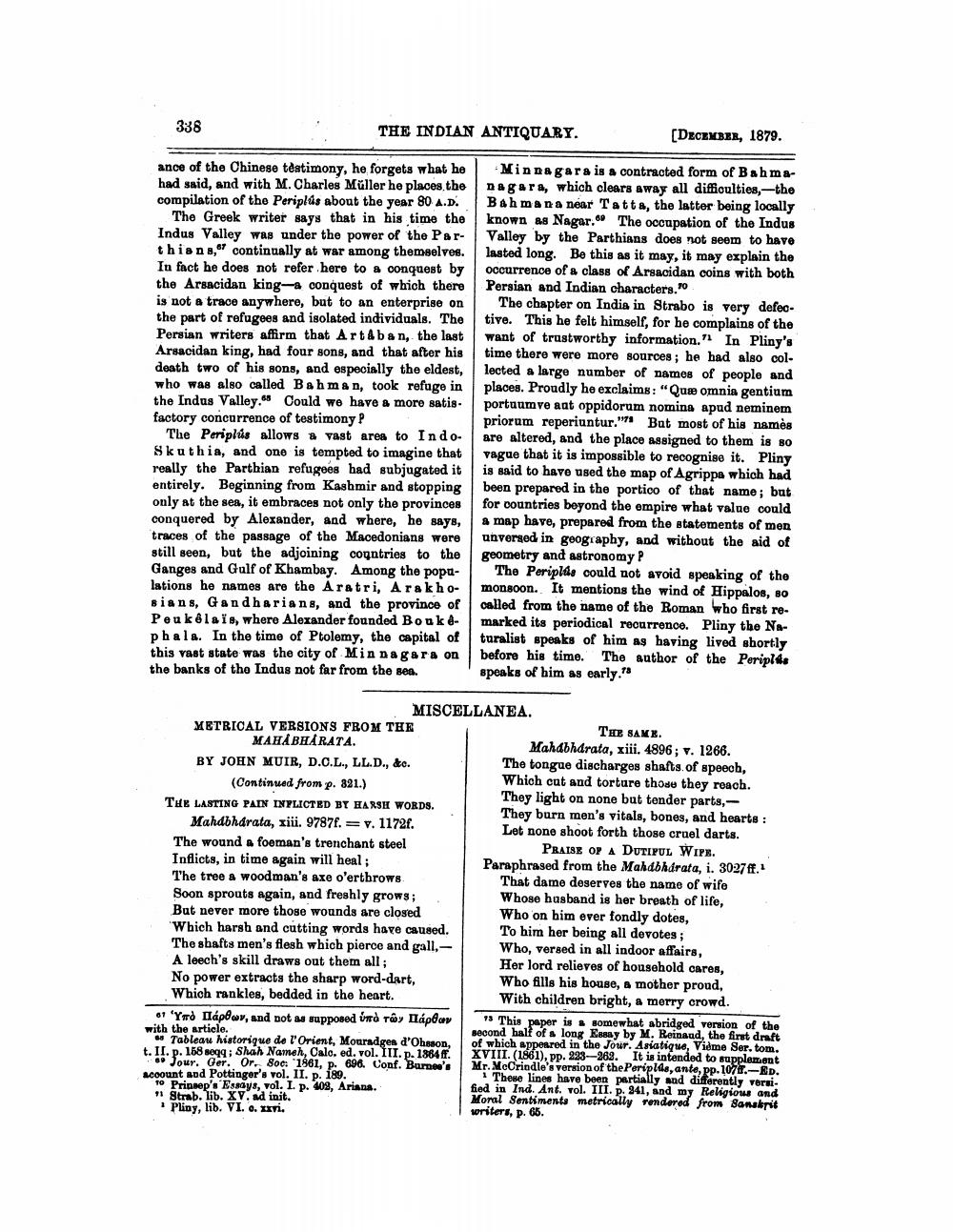________________
338
THE INDIAN ANTIQUARY.
[DECEMBER, 1879.
ance of the Chinese teatimony, he forgets what he had said, and with M. Charles Müller he places the compilation of the Periplus about the year 80 A.D.
The Greek writer says that in his time the Indus Valley was under the power of the Parthians, continually at war among themselves. In fact he does not refer here to a conquest by the Arsacidan king-a conquest of which there is not a trace anywhere, but to an enterprise on the part of refugees and isolated individuals. The Persian writers affirm that Artaban, the last Arsacidan king, had four sons, and that after his death two of his sons, and especially the eldest, who was also called Bahman, took refuge in the Indus Valley. Could we have a more satis. factory concurrence of testimony P
The Periplús allows a vast area to Indo. Skuthia, and one is tempted to imagine that really the Parthian refugees had subjugated it entirely. Beginning from Kashmir and stopping only at the sea, it embraces not only the provinces conquered by Alexander, and where, he says, traces of the passage of the Macedonians were still seen, but the adjoining coqntries to the Ganges and Gulf of Khambay. Among the populations he names are the Aratri, ArakhoBians, Gandharians, and the province of Peukblaïs, where Alexander founded Bouk - phala. In the time of Ptolemy, the capital of this vast state was the city of Minnagara on the banks of the Indus not far from the sea.
Minnagara is a contracted form of Bahmanagara, which clears away all difficulties,-the Bahmana near Tatta, the latter being locally known as Nagar. The occupation of the Indus Valley by the Parthians does not seem to have lasted long. Be this as it may, it may explain the occurrence of a class of Arsacidan coins with both Persian and Indian characters.no
The chapter on India in Strabo is very defective. This he felt himself, for be complains of the want of trustworthy information." In Pliny's time there were more sources; he had also collected a large number of names of people and places. Proudly he exclaims: "Quæ omnia gentium portuumve aut oppidorum nomina apud neminem priorum reperiuntur." But most of his names are altered, and the place assigned to them is so vague that it is impossible to recognise it. Pliny is said to have used the map of Agrippa which had been prepared in the portico of that name; but for countries beyond the empire what value could a map have, prepared from the statements of men unverged in geography, and without the aid of geometry and astronomy P
The Periplus could not avoid speaking of the monsoon. It mentions the wind of Hippalos, BO called from the name of the Roman who first remarked its periodical recurrence. Pliny the Nturalist speaks of him as having lived shortly before his time. The author of the Periples speaks of him as early
MISCELLANEA. YETRICAL VERSIONS FROM THE
THE SAME. MAHABHARATA.
Mahabharata, xiii. 4896 ; v. 1266. BY JOHN MUIR, D.C.L., LL.D., &c.
The tongue discharges shafts of speech, (Continued from p. 321.)
Which cut and torture those they reach.
Thoy light on none but tender parts, THE LASTING PAIN INFLICTED BY HARSH WORDS.
They burn men's vitals, bones, and hearts : Mahdbharata, xiii. 9787f. = v. 1172f.
Let none shoot forth those cruel darts. The wound a foeman's trenchant steel
PRAISE OP A DUTIPUL WIPE. Inflicts, in time again will heal;
Paraphrased from the Mahabharata, i. 3027ff. The tree a woodman's axe o'erthrows
That dame deserves the name of wife Soon sprouts again, and freshly grows;
Whose husband is her breath of life, But never more those wounds are closed
Who on him ever fondly dotes, Which harsh and cutting words have caused. To him her being all devotes ; The shafts men's flesh which pierce and gall - Who, versed in all indoor affairs, A leech's skill draws out them all;
Her lord relieves of household cares, No power extracts the sharp word-dart,
Who fills his house, a mother proud, Which rankles, bedded in the heart.
With children bright, a merry crowd. o 'Yo llápow, and not as supposed Und Tây Tápan * This paper is somewhat abridged version of the with the article.
second half of s long Essay by M. Reinand, the first draft - Tableau historique de l'Orient, Mouradges d'Ohsson, of which appeared in the Jour. Asiatique, Vième Ser. tom. t. II. p. 158 seqg; Shah Nameh, Calc. ed. vol. III. p. 1884ff. XVIII. (1861), pp. 223--362. It is intended to supplement
* Jour. Ger. Or. 8oc: "1861, p. 696. Conf. Barneo's Mr. McCrindle's version of the Periphs, ante, pp.1078.D. account and Pottinger's vol. II. p. 189.
1 These lines have been partially and differently versi. 10 Prionep's Essays, vol. I. p. 402, Ariana.
fied in Ind. Ant. vol. III. p. 941, and my Religious and +1 Strab. lib. XV. ad init.
Moral Sentiments metrically rendered from Sanskrit Pliny, lib. VI. c. uri.
writers, p. 65.




